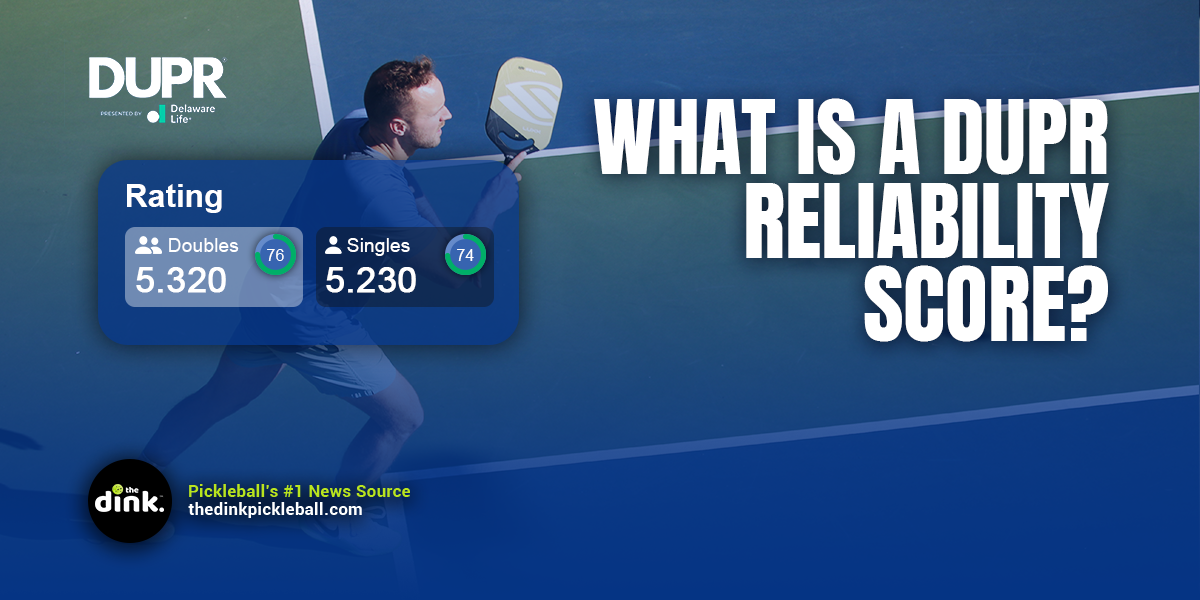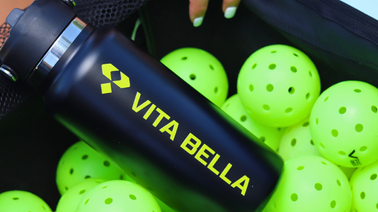
Introducing the DUPR Reliability Score and What It Means for Your Rating
DUPR (Dynamic Universal Pickleball Rating) has released the DUPR Reliability Score, its newest metric to help you better understand your rating.
Players will now have two numbers on their player profile: their DUPR Rating, which provides an assessment of your current pickleball skill level, and the Reliability Score, a percentage that indicates your progress towards achieving a reliable rating.

What is the Reliability Score? How is it different from my DUPR Rating?
Your DUPR rating provides a real-time assessment of your pickleball skill level based on your match results. The Reliability Score indicates how far you have progressed in achieving a reliable rating.
Your rating reliability depends on a few things – how many match results are in DUPR's system, how recently you’ve played and the variety of players you’ve played against. A higher reliability percentage means you’re a player who is consistently uploading match results in the system, while someone with a lower score means that there is some catching up (i.e. more playing!) to be done.
A player’s Reliability Score is calculated as a percentage between 1 and 100. Players who have a score of at least 60 percent have a reliable rating.
Both singles and doubles ratings have a corresponding Reliability Score.
What does it measure?
The Reliability Score measures a player’s progress in achieving a rating that is a dependable representation of their skill level. It looks at a number of factors, including how recently you’ve played, who you’ve played against, the types of matches you play and the recency of your results.
New players will have lower reliability scores as they are just getting started on DUPR, while players that have more results and play frequently will have higher reliability scores.
What is a good reliability score?
A good reliability score is 60 percent or higher. That means that a player can be confident they will have a good, competitive experience when playing others at the same level or finding events at that level.
Reliability scores that are lower than 60 percent is a sign that a player is still progressing towards reliability. This likely means they need to play more and enter their results. A rating of 100 percent is considered to be fully reliable, but anything above 60 percent is a good reliability score.
How does the Reliability Score help players?
A reliability score shows how close you are to achieving a reliable rating. When you have a reliable rating, you can be confident that you will have fun, competitive play with others at a similar level.
Players who have more results in DUPR will have higher reliability scores because there are more match results to analyze, offering a more in-depth view of your ability. A player who is just starting out will have a lower reliability score because DUPR does not have as many results to analyze. As players play more and share their results with DUPR, their rating becomes more and more reliable, and their reliability score will go up.
For example, a player who consistently plays and enters match scores will have a more reliable rating than a player who has played once or twice, or only plays against the same person. As you progress in your pickleball journey by playing more, consistently entering your scores and playing a broader range of people will enhance your reliability score.
What will reliability score be used for?
Players can use the reliability score to have more insight into their rating. Clubs can use the Reliability Score to better evaluate players, and may even use it as a threshold for event eligibility to ensure players have a good, competitive experience.
How can I make my rating more reliable?
Your match count and the recency of those matches are a big component of your Reliability Score. But not all matches are equal in how much new information they provide to the dependability of your rating. In order to make your rating more reliable, focus on playing matches that satisfy the following criteria:
- Play with various partners and opponents
- Play against similarly rated opponents
- Play Club/Tournament Matches
- Play against highly-reliable players
How should I expect my reliability score to move over time?
Each match you play will increase your score, but the amount it goes up will depend on many factors that consider how much new information we are getting from the match. Your Reliability Score will decrease over time if you are not recording matches.
What are the steps I can take to get a good Reliability Score?
There are many ways for a player to reach a good reliability score (60 percent). The key here is that there are many paths you can take to make your rating more reliable, but some paths might require more matches than others.
The biggest takeaway is to play frequently and against a broad group of players. If you’re new to DUPR, we have some sample pathways to help you get on the road to reliability. If you’ve been playing for a while and want to increase your reliability score, we have some ideas for you to go from 60 percent to 100 percent.


How do I maintain a good Reliability Score?
Play with a broad group of competitors. Your reliability score will decrease over time if you do not record new matches. To maintain your reliability score, we encourage you to log matches on a consistent basis.
For example, a player with a 100 percent Reliability Score could decrease to 60 percent over the course of six or so months if they don’t enter results. A 60 percent score can drop to 30 percent over the course of three months without entering results. A 30 percent score can drop to just under 10 percent over the course of six months if a player does not continue to enter results.
This is because DUPR’s rating places more emphasis on more recent matches as that provides an assessment of your current skill level. Older matches do not have as much impact on your rating.
Is my Reliability Score or my rating more important?
Your DUPR rating is a real-time assessment of your skill level. The reliability score is a supporting measure that showcases your progress in achieving a dependable rating (ie how frequently you play, how recent your results are and the pool of players you are playing against).
As players begin to play and enter scores into DUPR, ratings can fluctuate early on in their DUPR journey as they play different players. As players continue to play and enter more scores, the confidence in their assessment increases. Players who are new to DUPR will have lower reliability scores than players who are consistently playing and submitting results.
How often will my Reliability Score update?
Your Reliability Score will update weekly on Tuesdays.










